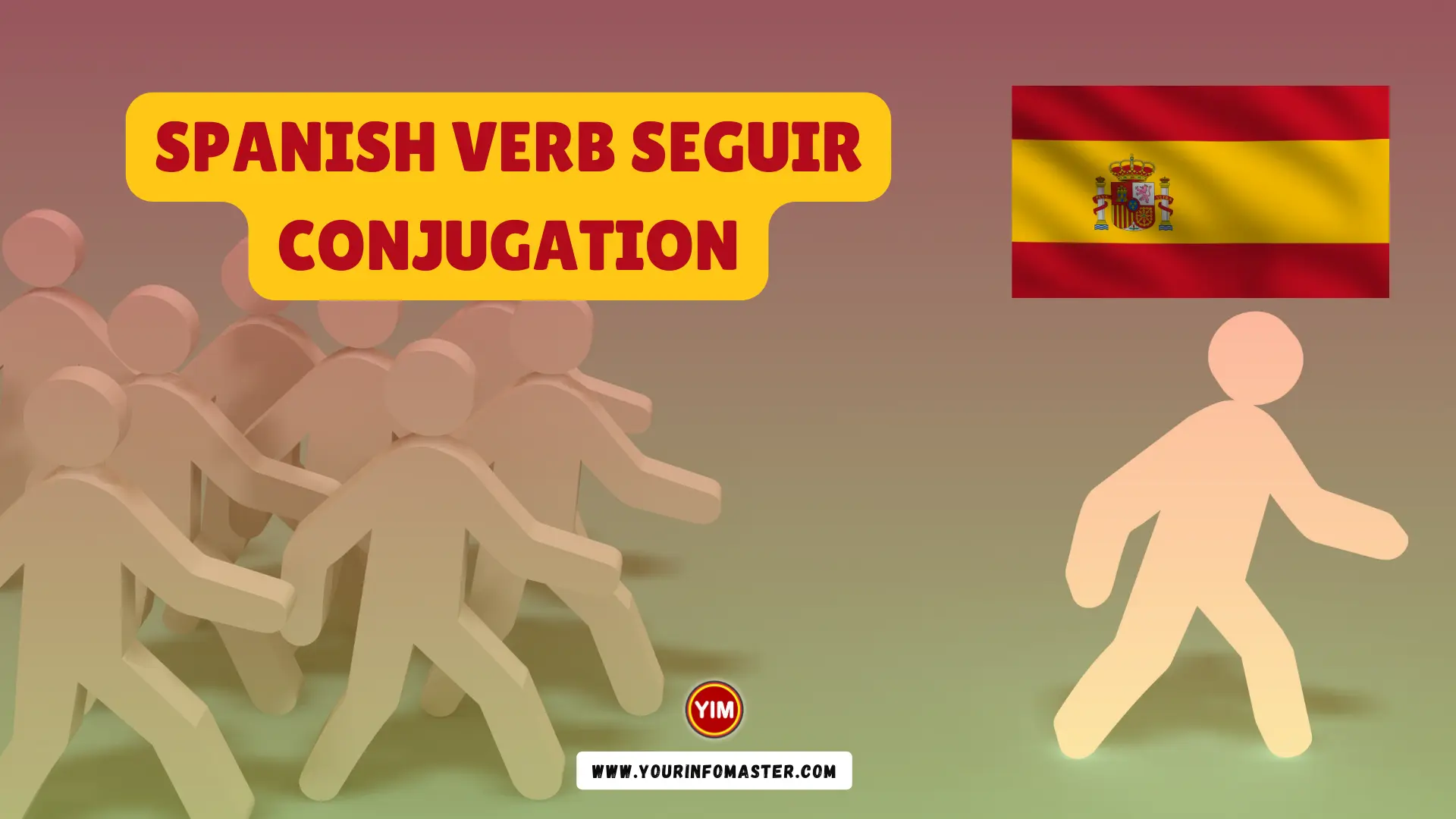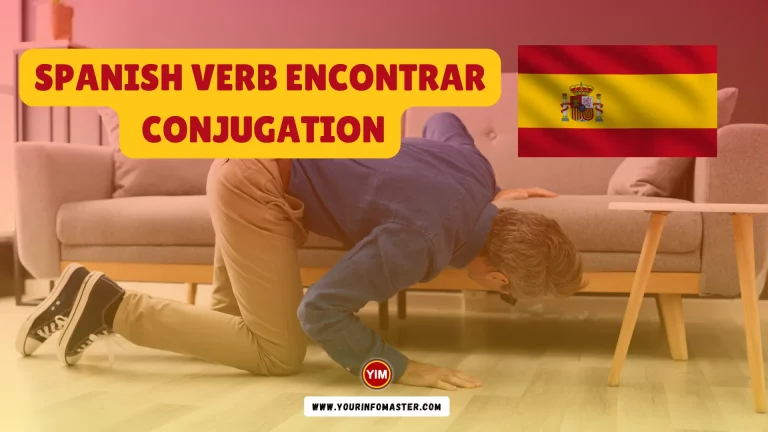In this article, I am going to explain the Spanish verb Seguir Conjugation, Seguir synonyms, Example Sentences with Seguir, Antonyms for Seguir, meaning and translation.
In the rhythmic dance of the Spanish language, the verb “seguir” takes center stage, guiding us through the continuous flow of actions and pursuits.
Like a river flowing steadily, “seguir” embodies the essence of continuity and persistence. Join us as we delve into the enchanting world of the Spanish verb “seguir” and discover its diverse conjugations that keep us moving forward.
Check also: Spanish Verb Ver Conjugation, Meaning, Translation, Examples
Origin and History of Seguir
The Spanish verb “seguir” traces its roots back to the Latin word “sequi,” meaning “to follow.” Throughout centuries of linguistic evolution, “seguir” has grown into a versatile verb, symbolizing the concept of moving forward or adhering to a course of action.
What is the Meaning of Seguir?
At its core, “seguir” translates to “to follow” or “to continue.” However, its significance extends beyond simple action, signifying a sense of persistence, adherence, or pursuit of something.
Real-World Examples
Example 1: Sigue las instrucciones detenidamente. (Follow the instructions carefully.)
In this example, “sigue” denotes the action of adhering to or following the instructions diligently.
Example 2: Seguimos trabajando en el proyecto a pesar de los obstáculos. (We continue working on the project despite the obstacles.)
Here, “seguimos” conveys the idea of persisting or continuing to work on the project, despite facing challenges.
List of Synonyms for Seguir
- Continuar (to continue)
- Proseguir (to proceed)
- Mantener (to maintain)
- Perseverar (to persevere)
- Persistir (to persist)
- Seguir adelante (to move forward)
- Continuar con (to carry on with)
- No cesar (to not cease)
- Apegarse (to stick to)
- Prosseguir (to push forward)
10 Sentences including Seguir in Spanish
- Sigue tu camino y nunca te rindas. (Follow your path and never give up.)
- Seguimos investigando para encontrar la verdad. (We continue investigating to find the truth.)
- Ella sigue sus sueños sin importar las dificultades. (She follows her dreams no matter the difficulties.)
- No puedes seguir ignorando la realidad. (You can’t keep ignoring the reality.)
- Sigamos explorando nuevas posibilidades. (Let’s keep exploring new possibilities.)
- Sigue aprendiendo cada día. (Keep learning every day.)
- Los niños siguen al líder del grupo. (The children follow the leader of the group.)
- Seguimos luchando por un mundo mejor. (We keep fighting for a better world.)
- El equipo sigue mejorando su desempeño. (The team continues to improve their performance.)
- No debes seguir esa mala influencia. (You should not follow that bad influence.)
Check also: Spanish Verb Tener Conjugation, Meaning, Translation, Examples
Seguir Present Indicative
- Yo sigo (I follow/continue)
- Tú sigues (You follow/continue)
- Él/Ella/Usted sigue (He/She/You follow/continue)
- Nosotros/Nosotras seguimos (We follow/continue)
- Vosotros/Vosotras seguís (You all follow/continue)
- Ellos/Ellas/Ustedes siguen (They/You all follow/continue)
Seguir Preterite Indicative
- Yo seguí (I followed/continued)
- Tú seguiste (You followed/continued)
- Él/Ella/Usted siguió (He/She/You followed/continued)
- Nosotros/Nosotras seguimos (We followed/continued)
- Vosotros/Vosotras seguisteis (You all followed/continued)
- Ellos/Ellas/Ustedes siguieron (They/You all followed/continued)
Seguir Imperfect Indicative
- Yo seguía (I used to follow/continue)
- Tú seguías (You used to follow/continue)
- Él/Ella/Usted seguía (He/She/You used to follow/continue)
- Nosotros/Nosotras seguíamos (We used to follow/continue)
- Vosotros/Vosotras seguíais (You all used to follow/continue)
- Ellos/Ellas/Ustedes seguían (They/You all used to follow/continue)
Seguir Future Indicative
- Yo seguiré (I will follow/continue)
- Tú seguirás (You will follow/continue)
- Él/Ella/Usted seguirá (He/She/You will follow/continue)
- Nosotros/Nosotras seguiremos (We will follow/continue)
- Vosotros/Vosotras seguiréis (You all will follow/continue)
- Ellos/Ellas/Ustedes seguirán (They/You all will follow/continue)
Seguir Periphrastic Future Indicative
- Yo voy a seguir (I am going to follow/continue)
- Tú vas a seguir (You are going to follow/continue)
- Él/Ella/Usted va a seguir (He/She/You are going to follow/continue)
- Nosotros/Nosotras vamos a seguir (We are going to follow/continue)
- Vosotros/Vosotras vais a seguir (You all are going to follow/continue)
- Ellos/Ellas/Ustedes van a seguir (They/You all are going to follow/continue)
Seguir Conditional Indicative
- Yo seguiría (I would follow/continue)
- Tú seguirías (You would follow/continue)
- Él/Ella/Usted seguiría (He/She/You would follow/continue)
- Nosotros/Nosotras seguiríamos (We would follow/continue)
- Vosotros/Vosotras seguiríais (You all would follow/continue)
- Ellos/Ellas/Ustedes seguirían (They/You all would follow/continue)
Seguir Present Progressive/Gerund Form
- Yo estoy siguiendo (I am following/continuing)
- Tú estás siguiendo (You are following/continuing)
- Él/Ella/Usted está siguiendo (He/She/You are following/continuing)
- Nosotros/Nosotras estamos siguiendo (We are following/continuing)
- Vosotros/Vosotras estáis siguiendo (You all are following/continuing)
- Ellos/Ellas/Ustedes están siguiendo (They/You all are following/continuing)
Seguir Past Participle
- Seguido (followed/continued)
Seguir Present Subjunctive
- Que yo siga (That I follow/continue)
- Que tú sigas (That you follow/continue)
- Que él/ella/usted siga (That he/she/you follow/continue)
- Que nosotros/nosotras sigamos (That we follow/continue)
- Que vosotros/vosotras sigáis (That you all follow/continue)
- Que ellos/ellas/ustedes sigan (That they/you all follow/continue)
Seguir Imperfect Subjunctive
- Que yo siguiera (That I followed/continued)
- Que tú siguieras (That you followed/continued)
- Que él/ella/usted siguiera (That he/she/you followed/continued)
- Que nosotros/nosotras siguiéramos (That we followed/continued)
- Que vosotros/vosotras siguierais (That you all followed/continued)
- Que ellos/ellas/ustedes siguieran (That they/you all followed/continued)
Check also: What is another word for Cheerful? | Cheerful Synonyms, Antonyms and Sentences
Seguir Imperative
- Sigue tú (Follow/Continue – informal singular)
- No sigas tú (Don’t follow/continue – informal singular)
- Siga usted (Follow/Continue – formal singular)
- No siga usted (Don’t follow/continue – formal singular)
- Sigamos nosotros/nosotras (Let’s follow/continue)
- No sigamos nosotros/nosotras (Let’s not follow/continue)
- Seguid vosotros/vosotras (Follow/Continue – informal plural)
- No sigáis vosotros/vosotras (Don’t follow/continue – informal plural)
- Sigan ellos/ellas/ustedes (Follow/Continue – formal plural)
- No sigan ellos/ellas/ustedes (Don’t follow/continue – formal plural)
Conclusion
In conclusion, “seguir” leads us on a captivating journey of continuity and persistence. It enables us to navigate through life’s paths, adhering to our goals, dreams, and aspirations. So, next time you encounter the verb “seguir” while exploring the rich world of Spanish, remember its essence lies in the art of continuous motion. ¡Sigue adelante y descubre nuevas horizontes! (Keep moving forward and discover new horizons!)
If you really enjoyed the article about “Spanish Verb Seguir Conjugation,” then I would be very grateful if you’d help it spread by emailing it to your friends or sharing it on Twitter, Instagram, or Facebook. Thank you!
Have you read “Example Sentences with Seguir?” Which of these blogs are you reading, and how is it similar to one of them?
Read More
- Spanish Verb Poner Conjugation, Meaning, Translation, Examples
- Spanish Verb Leer Conjugation, Meaning, Translation, Examples
- Spanish Verb Dar Conjugation, Meaning, Translation, Examples
- What is another word for Dark? | Dark Synonyms, Antonyms and Sentences
- What is another word for Diverse? | Diverse Synonyms, Antonyms and Sentences
- What is another word for Discuss? | Discuss Synonyms, Antonyms and Sentences
- What is another word for Development? | Development Synonyms, Antonyms and Sentences
- What is another word for Despite? | Despite Synonyms, Antonyms and Sentences
- What is another word for Demonstrate? | Demonstrate Synonyms, Antonyms and Sentences
- What is another word for Develop? | Develop Synonyms, Antonyms and Sentences
- Spanish Verb Conocer Conjugation, Meaning, Translation, Examples
- Spanish Verb Salir Conjugation, Meaning, Translation, Examples
- Spanish Verb Saber Conjugation, Meaning, Translation, Examples
- Spanish Verb Querer Conjugation, Meaning, Translation, Examples
- Spanish Verb Venir Conjugation, Meaning, Translation, Examples
- Spanish Verb Poder Conjugation, Meaning, Translation, Examples
- Spanish Verb Decir Conjugation, Meaning, Translation, Examples







